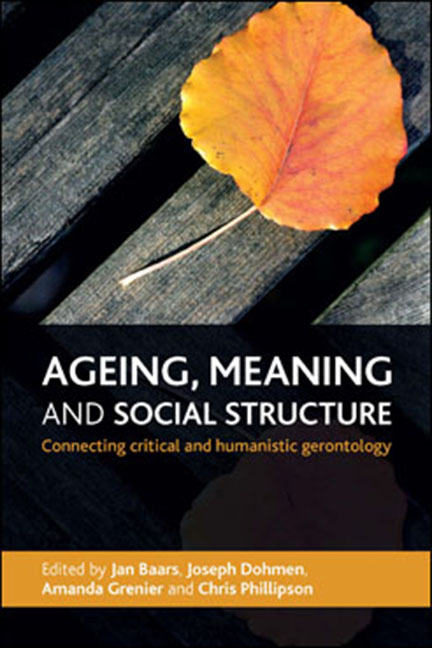Book contents
- Frontmatter
- Contents
- Notes on contributors
- Acknowledgements
- one Introduction
- two Connecting meaning with social structure: theoretical foundations
- three My own life: ethics, ageing and lifestyle
- four Rethinking agency in late life: structural and interpretive approaches
- five Dementia: beyond structures of medicalisation and cultural neglect
- six Self-realisation and ageing: a spiritual perspective
- seven Social ability or social frailty? The balance between autonomy and connectedness in the lives of older people
- eight Critical perspectives on social work with older people
- nine Community-based participatory action research: opportunities and challenges for critical gerontology
- ten Commentary: contingent ageing, naturalisation and some rays of intellectual hope
- Index
three - My own life: ethics, ageing and lifestyle
Published online by Cambridge University Press: 07 September 2022
- Frontmatter
- Contents
- Notes on contributors
- Acknowledgements
- one Introduction
- two Connecting meaning with social structure: theoretical foundations
- three My own life: ethics, ageing and lifestyle
- four Rethinking agency in late life: structural and interpretive approaches
- five Dementia: beyond structures of medicalisation and cultural neglect
- six Self-realisation and ageing: a spiritual perspective
- seven Social ability or social frailty? The balance between autonomy and connectedness in the lives of older people
- eight Critical perspectives on social work with older people
- nine Community-based participatory action research: opportunities and challenges for critical gerontology
- ten Commentary: contingent ageing, naturalisation and some rays of intellectual hope
- Index
Summary
Life is a battle. (Seneca)
Introduction
In recent decades there has been a shift from what may be termed a politics of emancipation to a politics of life. In a post-traditional society, late modern people, young and old, are individualised and forced to lead a life on the basis of a reflexive lifestyle. Key aims for older people include those associated with positive health and successful ageing. In this chapter I present a moral lifestyle for later life as an alternative to the dominant neoliberal concept of the choice biography. The first part discusses the transition to a politics of life as a daily struggle for a life of one's own. I then show how current moral philosophy responds critically to this modern development. In the last part, I develop a lifestyle for later life. Through a moral lifestyle, older people will be better able to relate to the cultural dictates that confront them, and may together try to reappropriate their own lives.
From emancipation to life politics
Years of emancipation
In 1958, during the Cold War, social liberal Isaiah Berlin published ‘Two concepts of liberty’. He pointed at the great importance of moral directives for the development of Western culture, and focused on one of the most fundamental concepts of modernity: liberty. Among the many varieties of liberty, he distinguished between two central concepts: negative and positive freedom. Berlin understood negative freedom as non-interference:
I am normally said to be free to the degree to which no man or body of men interferes with my activity.[…] The criterion of oppression is the part that I believe to be played by other human beings, directly or indirectly, with or without the intention of doing so, in frustrating my wishes. By being free in this sense I mean not being interfered with by others. The wider the area of non-interference the wider my freedom. (Berlin, 1958, p 3)
Berlin's interpretation of the concept of positive freedom is characterised by the notion of self-direction, and produces an uncommonly striking description of late modern self-awareness:
I wish my life and decisions to depend on myself, not on external forces of whatever kind. I wish to be the instrument of my own, not of other men’s, acts of will.
- Type
- Chapter
- Information
- Ageing, Meaning and Social StructureConnecting Critical and Humanistic Gerontology, pp. 31 - 54Publisher: Bristol University PressPrint publication year: 2013



